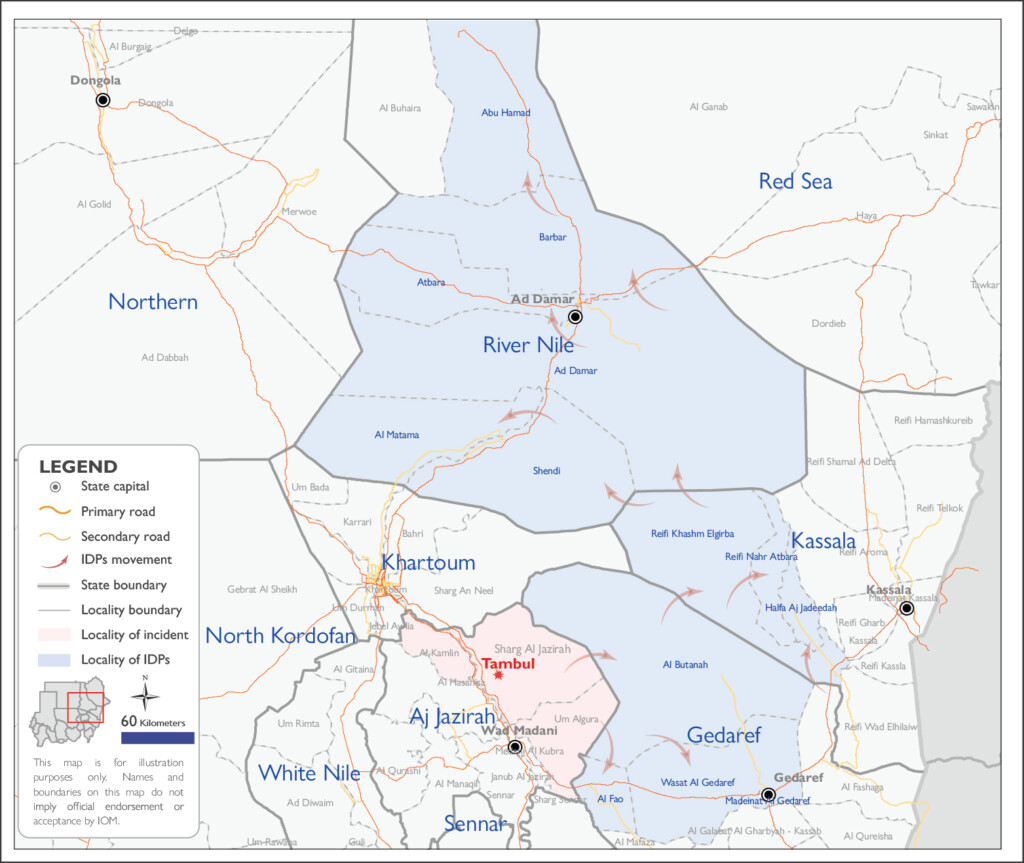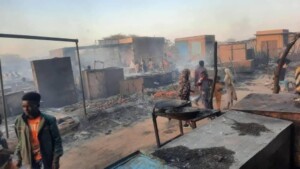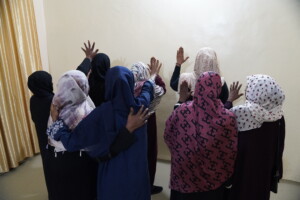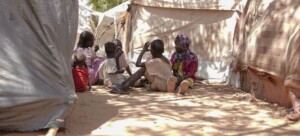IOM: 11+ million displaced in Sudan, thousands flee violence in El Gezira and West Darfur

Displacement from El Gezira to Kassala and El Gedaref, October 28 (Map: IOM)
More than 11 million people have been displaced by Sudan’s ongoing war, IOM said, as waves of displaced people continue to pour into El Gedaref and New Halfa in Kassala, escaping violence in eastern El Gezira. Hundreds of families from West Darfur have also arrived in eastern Chad’s Milli camp, fleeing violence in Sirba, Kulbus, and Jebel Moon.
The International Organization for Migration (IOM) said on Tuesday that the number of people displaced by Sudan’s ongoing war has surpassed 11 million.
Since October 20, IOM reports that 119,395 people—representing 23,879 families—have fled eastern El Gezira, seeking refuge in El Fao, El Butana, and New Halfa in Kassala, as well as in River Nile’s Atbara and Shendi areas. Between 17,000 and 20,000 people have reportedly fled to Khartoum state.
The RSF launched a large-scale attack on villages in eastern, northern, and western El Gezira after the RSF commander of El Gezira, Abu Agla Keikel, defected and rejoined the army last week.
A source in New Halfa reported that 6,000 families are now residing in 24 shelters, but noted urgent needs, with 5,500 families still lacking tents and 200 toilets needed.
New Halfa’s stadium is being used as overflow space, and a mobile health unit was established to handle the influx of up to 500 patients arriving in poor health. Two deaths and a sexual assault case have been recorded. Food shortages persist “despite efforts from the World Food Programme and other aid organisations”, the source said.
El Gedaref
The situation in El Gedaref remains dire, with increasing arrivals from El Gezira and Tamboul. Bashir El Sadig, director of a children’s organisation in El Gedaref, reported that the majority of the displaced are women, children, and elderly people. “The displaced, struggling to find adequate transport, arrive via crowded vehicles, often riding on bus rooftops,” he told Radio Dabanga.
“With local facilities stretched beyond capacity, displaced families are taking refuge in Gedaref’s market area, the scientific institute, and in zones designated for previous waves of displaced people from Singa.” El Sadig further noted that many now reside on the streets near the offices of international organisations in the hope of receiving aid.
“Some early arrivals were able to rent houses or stay with families, leading to overcrowded homes with up to 18 people each.” El Sadig added that water scarcity has driven prices to 4,000 to 5,000 Sudanese pounds (SDG) per barrel. Rising costs have forced many Gedaref residents to rent out their homes and relocate to more affordable areas as living expenses continue to increase.
“Young local volunteers have been distributing food via motorbikes, though they struggle to meet the vast demand.”
International organisations have reportedly set up tents to provide limited support, while representatives from the United Nations Children’s Fund (UNICEF) and the Ministry of Health have inspected conditions in the area. El Sadig raised concerns about potential outbreaks of diseases such as dengue and malaria, citing overcrowding and a lack of medical resources.
West Darfur
According to the International Organization for Migration (IOM), approximately 3,643 families were displaced from multiple areas in Kulbus locality in West Darfur between Saturday and Monday.
Earlier this month, areas north of El Geneina, the capital of West Darfur, witnessed a large deployment of Rapid Support Forces (RSF), following battles between the Sudanese Joint Force and the RSF in Jebel Awun in Kulbus. On October 14, Sudanese Armed Forces (SAF) warplanes bombed several locations in El Geneina, the capital of West Darfur, including the city’s airport and surrounding neighbourhoods.
A Sudanese refugee who fled from Sirba to the Milli camp in eastern Chad told Radio Dabanga that ongoing violence in West Darfur has forced nearly 95 percent of residents from Sirba, Jebel Moon, and Kulbus to cross into Chad.
The refugee added that a significant number of Sudanese arrivals at Milli camp received assistance from the United Nations Refugees agency (UNHCR) and other humanitarian organisations. These organisations provided initial shelter and food supplies for three days, though officials reportedly advised the refugees to “rely on themselves until additional aid arrives”. Radio Dabanga has yet to obtain a response from humanitarian organisations in the area.
The IOM Displacement Tracking Matrix reported that clashes in Kulbus in West Darfur displaced roughly 6,206 families between September 30 and October 21, with field teams confirming that families from 10 villages in Kulbus have crossed into Chad.
Meanwhile, conditions in Sudanese refugee camps in eastern Chad have worsened, with deteriorating health services and a rise in diseases, especially malaria, eye infections, and undiagnosed fevers.
A Sudanese refugee in Iridimi camp told Radio Dabanga that many refugees suffer from malaria and eye infections due to the pervasive presence of mosquitoes and flies. In August, multiple houses collapsed in Iridimi camp due to heavy rain and flooding.
The source added that food shortages and disease have led to malnutrition among children and the elderly, resulting in fatalities linked to malnutrition in recent weeks.











 and then
and then